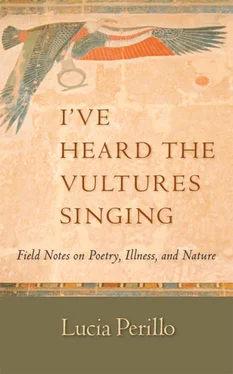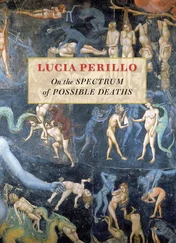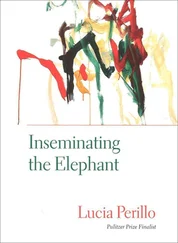Now when I go out to Kennedy Creek, I ride the trail on an electric scooter. I am glad for the chance to let my physical self dissolve into the wind and the trees, but other human spectators keep reminding me that the trees are they and I am me , a hunk of meat with no stamina for the wilderness.
Don’t get me wrong; I’m grateful for the people who push me out when I bog down in the mud. But it drives me crazy when someone tries to take me aside (that is, if you can take someone on a motorized vehicle aside) to say: I think it’s great someone like you is out here . Someone like me, meaning not like them, and thus do I get corroboration, in my aggrandizement, about inhabiting the bardo zone. Meanwhile, the gulls squawk from the trees: the scrap! the scrap! They too do not belong here in the canopied forest. Giving me the hairy eyeball, as if they want to strip a tendon off of me.
Scientists don’t really know how salmon navigate: the smell of the birth-stream appears to be crucial, but olfactory recognition would not explain how salmon operate once they get out of sniffing range. I think of our not-knowing as another sort of bardo zone, in that not-knowing forces us to abandon categories and slots as we hover between hypotheses. Freeman House grapples with the mystery of salmon by concluding that the best way to study it is by means of contemplation:
Reductionist science attempts to understand the lives of salmon in separation from their field of being, the living sea. And we don’t have the intellectual or perceptual tools to consider the interactions in a milieu so different from our own. .
If our engagement with natural processes is beyond our ability to measure and quantify in the laboratory, it may be that the only way to immerse ourselves in those processes is through the long practice of cumulative attentiveness. In the close-mouthed world of reciprocal perception, there is no way to learn to live in place but from the place itself. Even the waters can teach us, if we can quiet our appetite for “rational” explanation.
In lieu of this kind of quiet, most of us attempt to come to terms with the mind of the salmon by metaphorizing their navigational abilities in terms of our own way-finding inventions. But of course salmon don’t have compasses or maps, only the mysterious receptor that is their body, which is able to measure, in the words of House, “the buzz and pulse of electromagnetic fields and currents, infinitesimally minute differences in temperature and salinity and light and food.” Some day we may figure out how the body registers these properties, but the mind that processes this information will likely remain elusive.
Chuang Tzu, the Taoist poet from sometime around the third century B.C., made man’s interaction with the natural world his chief subject of study. His poem “The Joy of Fishes” comprises a dialectic on the subject of man’s attributing human emotions to animals. In Thomas Merton’s translation, it begins:
Chuang Tzu and Hui Tzu
Were crossing Hao river
by the dam.
Chuang said:
“See how free
The fishes leap and dart:
That is their happiness.”
A conversation ensues about how Chuang can know whether or not the fish are happy, and the poem ends with Chuang winning the debate by insisting on Hui’s precision of speech:
“What you asked me was
‘How do you know
what makes fishes happy?’
From the terms of your question
You evidently know I know
What makes fishes happy.
“I know the joy of fishes
In the river
Through my own joy, as I go walking
Along the same river.”
What I like about this poem is how it tells us that it’s okay to cut ourselves some slack when it comes to our habit of anthropomorphism. When it comes to other minds, the best we can do is imagine an analogue of our own mind, and Chuang Tzu is suggesting that it should be obvious that when we make a statement about the minds of animals we are really talking about ourselves.
What is obvious about the people who come to Kennedy Creek is that they too are seized by joy. No mere sign can keep the children from squealing, and even adult visitors are liable to give out cries that have been forged by their amazement. Fleetingly, I get the sense we should not be here, trampling the bank and transforming the woods into a sort of piscine theme park. But staying home would be another form of betrayal, because it would be too easy then to forget about the fish and how their population is faring. And it is also good that we be reminded that the stink and decay we generally find abhorrent also has its place.
By now the Northwest has seen more than a decade of legal wrangling over whether twenty-six populations of salmon should be on the federal list of species that are threatened or endangered. At issue is the distinction between wild fish and those reared in hatcheries, which have churned out salmon in this country since the late nineteenth century. Such was the industrial era’s faith in technology that its fixes, such as hatcheries, were seen as perfectly adequate substitutions for wild systems that evolved over the course of a hundred thousand years.
Of course each technological fix usually breeds new glitches, such as the various behaviors of hatchery fish (like reduced fear of predators) that leave them vulnerable to living in the wild. And so it would seem crucial to the species’ long-term survival to preserve the genetic diversity of wild fish, although populations of some of these wild runs have dwindled to less than a hundred fish. Already so much interbreeding has taken place that, genetically, salmon inhabit a bardo zone, a state of being neither this nor that, neither fully hatchery-produced nor fully wild, a threshold from which biologists hope to coax them back by building up wild populations.
The natural world has a way of backlashing when technology attempts to meddle, and the environmental movement of the past century was founded on cases where the industrial world’s blind faith in itself caused the balance of nature to go awry. And because scorning technology was one of the poses of my young adulthood, it is ironic and painful to me that I find myself so completely lashed to the man-made world. Now my presence at Kennedy Creek requires a hundred pounds of plastic and metal and toxic chemicals, a battery-powered juggernaut that can roll only across terrain that has been cleared. I know I am only one small woman trammeling the wilderness. Still, it grieves me that I do trammel. What I would embrace, I crush.
I’m also not sure how I feel about the whole idea of karma. On the one hand, it makes me sort of edgy to think that my body’s hard luck might be due to the fact that in some former life I was a major bitch. And I fear that in this life I have been so weak-willed and lazy that I might be reduced to the realm of the hungry ghosts in the next.
It is almost spooky: how salmon put the Bardo Thodol ’s reincarnation hypothesis into physical form. The dead one’s molecules scatter, to become maybe part of those 137 other species. That is both thrilling and hopeful to me, the idea that someday some molecule of me could be incorporated into the agile body of a coyote. Or something not even so glamorous, like a long-tailed weasel. Or a Cope’s giant salamander. Or a glaucous-winged gull.
Western culture finds a sign of its sophistication in the extent to which the human body is removed, via chemical means, like the pharaohs, from rot’s cycling of molecules — no longer are we allowed to simply become food (well, we have made ourselves a slower meal for tinier creatures). Public hygiene dictates that our bodies not be left on scaffolds or chopped up and fed to carnivorous birds. And we have cultivated our primal taboos about the dead body at the same time as medicine has come to occupy a quasi-spiritual place in American life. The combination of these forces has led many people to view death as an aberration that we’ll soon be able to conquer through science and the proper frame of mind.
Читать дальше











![Various - Birds and Nature, Vol. 12 No. 5 [December 1902]](/books/745517/various-birds-and-nature-vol-12-no-5-december-thumb.webp)
![Various - Birds and Nature Vol. 11 No. 2 [February 1902]](/books/745533/various-birds-and-nature-vol-11-no-2-february-1-thumb.webp)